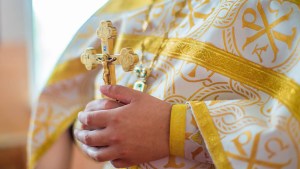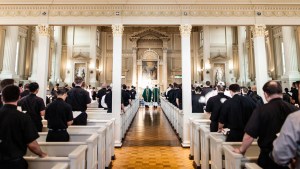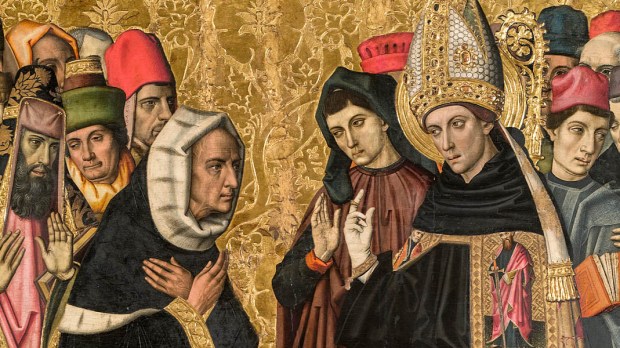Lenten Campaign 2025
This content is free of charge, as are all our articles.
Support us with a donation that is tax-deductible and enable us to continue to reach millions of readers.
“I just found out the priest that baptized me has been convicted of sexual abuse.”
While at lunch with a friend, he shared this part of his recent struggle with the Church. A millenial, a practicing Catholic, a man actively involved in the Church. He’s a man I know to be marked with a great faith. Nevertheless, the recent Pennsylvania Grand Jury Report shook him to the core. A man who communicated God’s saving grace to his family is part of this mess. How could it not deeply disturb my friend?
The sins of our fathers
Priests are called to be signposts for the Kingdom of heaven. Living as the angels already do, “neither married nor given in marriage” (Mt. 22:30), priests are supposed to stand apart, to live lives worthy of their noble calling. It is thus, rightly, all the more terrible when we fail in our vocations. I often think of the harrowing words of Our Lord: “Whoever causes one of these little ones who believe in me to sin, it would be better for him to have a great millstone fastened round his neck and to be drowned in the depth of the sea” (Mt. 18:6).
When the clerical sex abuse scandal first broke in Boston, I was beginning high school. I naturally turned to my mother for answers, who explained the crisis bluntly, saying, “If Jesus was betrayed by one of the apostles, why would we be surprised that he would still be betrayed today?”
Like many cradle Catholics, my mother has a faith with deep roots. She understood the humanity of the priesthood and wasn’t about to let the reality of sin challenge her confidence in the successors of the apostles. Judas was an apostle, but his treachery didn’t undermine her faith.

Read more:
When did priestly celibacy begin anyway?
Donatists and Traditores
The Christians of the 4th century already asked themselves the same theological question: What of the sacraments of a sinful priest? Under the edicts of the Roman Emperor Diocletian (who reigned from 284-305), Christian books were burned, Christian churches destroyed, and Christian priests were singled out for torture and humiliation. Diocletian commanded all of his subjects to offer incense to the Roman gods. For Christians this incense offering was tantamount to a direct denial of the faith. Those who gave up names of fellow Christians to Roman officials earned the name traditores, “those who handed over” or “traitors.”
The problem arose: What to do with the traditor priests? Could they be welcomed back to the fold? Or did their sin vitiate their priesthood? According to the Donatists—named for a bishop leader of their sect, Donatus—a traditor cleric could not validly celebrate the sacraments. Donatist rigorism held that no penance could reconcile the wrong of having betrayed other Christians so.
For the Church, however, the priest is only the minister of God’s grace in the sacraments. Rightly understood, God confers sacramental grace through the signs instituted by Christ. St. Augustine, who helped advanced the Church’s teaching during the Donatist controversy, teaches that a sacrament is a “visible sign of invisible grace.” God uses the sacraments instrumentally as the normal means of bestowing his grace. God alone is the primary cause of grace.

Read more:
What does it mean for a priest to be laicized?
Ex opere operato
Medieval theologians capture the principle that God causes sacramental grace in their Latin phrase ex opere operato. This phrase means, roughly: from the work the thing is done. Sacraments communicate grace by virtue of the action. As the Catechism puts it today: “From the moment that a sacrament is celebrated in accordance with the intention of the Church, the power of Christ and his Spirit acts in and through it, independently of the personal holiness of the minister” (CCC 1128). In other words, the sinfulness of the minister does not undermine the effectiveness of a sacrament.
St. Catherine of Siena, no stranger to wayward clergy, eloquently captures this truth with the image of light. Analogously using the light of the sacrament of Baptism in her Dialogue, she writes: “Each of you carries the light whole and undivided, for it cannot be divided by any imperfection in you who receive it or in those who administer it. You share as much of the light (that is the grace you receive in this sacrament) as your holy desire disposes you to receive.” The faithful who are well-prepared will receive all the graces God intends to bestow regardless of the minister’s own state.
Earthen vessels
We can appreciate, though, the horror of the Christian community in dealing with their traditor priests. Indeed, we’ve felt it today. While only a fool would believe the actions of such priests don’t undermine the faith of our people, we do know that, theologically speaking, Christ still used them. For all their crimes, the graces and merits of the cross still flowed from their hands to us at the altars of our churches.
St. Paul hinted at this great mystery, as he told the Corinthians: “But we have this treasure in earthen vessels, to show that the transcendent power belongs to God and not to us” (2 Cor 4:7). This truth should not be used to excuse clerical sin, of course. Still less should it shield sinful priests and bishops from the demands of justice. This truth does remind us, however, that sometimes our earthen vessels are worn. Indeed, sometimes broken. Yet the love and mercy of God, the true treasure of any Christian, will not cease to pour out into our fragile hearts.

Read more:
In the wake of abuse scandals, how does the Catholic Church screen future priests?

